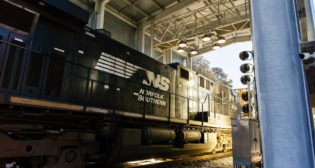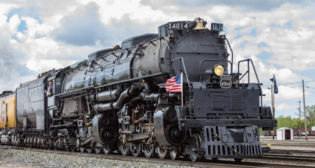
KCS 3Q21: ‘Commercial Headwinds’ Reduce Volumes (Updated, Cowen)
Written by Marybeth Luczak, Executive Editor
“We are encouraged that despite several commercial headwinds, our network is performing extremely well and we are delivering near record velocity and dwell,” KCS President and CEO Patrick J. Ottensmeyer said on Oct. 19.
Kansas City Southern (KCS) on Oct. 19 was the first Class I to report third-quarter 2021 earnings. Revenue for the potentially merger-bound railroad—back with original suitor Canadian Pacific (CP)—came in at $744.0 million, growing 13% from the prior-year period ($659.6 million), but volumes fell.
KCS attributed the revenue boost to mix, a higher fuel surcharge, and the strengthening of the Mexican peso against the U.S. dollar.
Carload volumes were down 3%, the railroad reported, because of “auto plant shut-downs driven by a global microchip shortage; service interruptions at Lázaro Cárdenas due to KCSM right-of-way blockages resulting from teachers’ protests; and increased regulation of refined fuel product shipments into Mexico resulting in supply chain disruptions.”


Third-quarter operating expenses were $492.1 million, including $36.5 million in merger costs. KCS posted (under GAAP) operating income of $251.9 million; net income of $156.5 million, or $1.71 per diluted share; and an operating ratio of 66.1%. Adjusted (non-GAAP), the operating ratio was 61.2%, a 2.4 point deterioration, and diluted EPS came in at $2.02, a 3% increase vs. the prior year.

As for operating metrics (see chart above), KCS reported that in third-quarter 2021, train velocity of 15.3 mph was up 6% from third-quarter 2020; terminal dwell time of 21.5 hours improved by 6%; and train length of 6,481 feet was 8% shorter.
Looking ahead, the railroad said it was “suspending previously provided guidance due to lack of visibility on impact of auto plant shutdowns, Lazaro Cardenas service interruptions, and refined fuel product supply chain disruptions.”

Commenting on the “path forward” for CPKC (Canadian Pacific Kansas City), KCS noted that the F-4 registration statement/preliminary proxy statement was filed with the SEC on Oct. 1; the COFECE application was filed on Oct. 5; and KCS and CP shareholder votes are expected in December.

“We are encouraged that despite several commercial headwinds, our network is performing extremely well and we are delivering near record velocity and dwell,” KCS President and CEO Patrick J. Ottensmeyer said. “Underlying industrial demand is strong, and KCS has maintained resources to prioritize customer service as volumes return to the network. As certain supply chain disruptions are resolved and our revenue environment improves, our network will be well-positioned to handle incremental volume while continuing to provide premium service to our customers.

“We are also very pleased to have announced our combination with Canadian Pacific, creating the first single-line rail network linking the U.S., Mexico and Canada. This historic combination will enhance competition, create new options for customers, and support economic growth in North America.”

The KCS Investor Relations site provides more details on third-quarter 2021.
Cowen Insight: ‘Brakes Applied to Guidance, Full Steam Ahead on Merger’

“KSU [Kansas City Southern] came in below consensus expectations on the bottom line in the third quarter as its Lazaro Port business, auto segment and refined fuel business were all severely challenged in the quarter due to various supply chain issues, causing the company to suspend full-year
guidance,” reported Cowen and Company analysts Jason H. Seidl (Managing Director and Railway Age Wall Street Contributing Editor), Matt Elkott and Elliot Alper. “Monthly trends (2HQ3 vs. 1HQ3) appear to trending favorably. CP/KSU merger continues to progress forward. Reiterate Outperform.”
Key Cowen Takeaways:
• “KSU reported 3Q revenue growth of 13%, above the consensus forecast, as challenged carloadings (intermodal, petroleum, autos) were offset by higher revenue/carload (noting soft comps). As we look at our quarter-to-date carloading data, carloads appear to continue to be weak, particularly on the intermodal side. Adjusted EPS for the quarter of $2.02 missed our estimate of $2.05 and the street forecast of $2.04, with adjusted OR of 61.2% missing our estimate of 59.2%. Higher expenses in the quarter were driven by fuel, FX, Mexico outsourcing reform, and derailment/casualty expenses.
• “Mexico continues to be a challenged market for KSU, as regulatory headwinds caused an 18% decline in lower energy reform volumes. This volume has moved to the trucking market which, given the differences of economies of scale, likely a temporary move in our view. Teacher strikes continue to be a problem as well, which have been a chronic issue that has not subsided; the Mexican government has not enforced any action to stop these protests that are affecting not only KSU, but other businesses as well. While we see Mexico as a continued challenge in the near-term (and potentially in the medium term), we believe that its autos segment in Mexico will rebound when macro-factors normalize, and were encouraged to hear that a large discount retailer is in talks with KSU as they are resourcing all their materials/production from Asia to Mexico, a promising supply chain shift we could see play out at a larger level over the next several years.
• “Management rescinded its full-year 2021 guidance, citing lack of visibility on its autos segment, Lazaro challenges, fuel product regulatory headwinds, and overall supply chain disruptions. We believe this was largely anticipated by the market and was reflected in our model; that being said, challenges in Mexico appear to be more impactful than we previously anticipated. KSU stated that about two-thirds of business will be repriced in 2022, and about half of that will be in the first quarter. Management stated they are increasingly concerned about inflation, and are ensuring pricing next year will adequately cover inflationary pressures plus additional pricing given the constrained environment.
• “The CP/KSU deal appears to be on track, with a shareholder meeting with KSU and CP before the end of the year, with the expectation that the deal will close into trust in 1Q22. In addition, management also expressed its confidence in receiving Mexican regulatory approval.
• “We adjust our 2021 and 2022 EPS estimates to $8.02 from $8.40, and $9.85 from $10.25, respectively. Our downward revision of our 2022 estimate is driven primarily on the notion that we expect both the international supply chain, and KSU’s Mexico operations to remain challenged well into 2022. That being said, our price target is now based on CP’s offer price for KSU (2.884 CP common shares plus $90 cash), and maintained at $300.”



